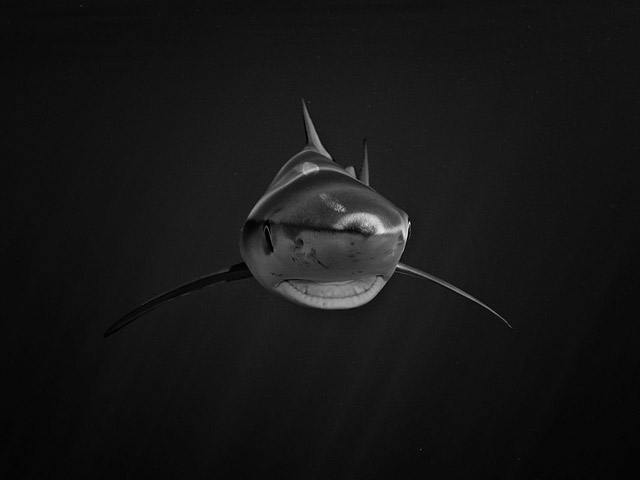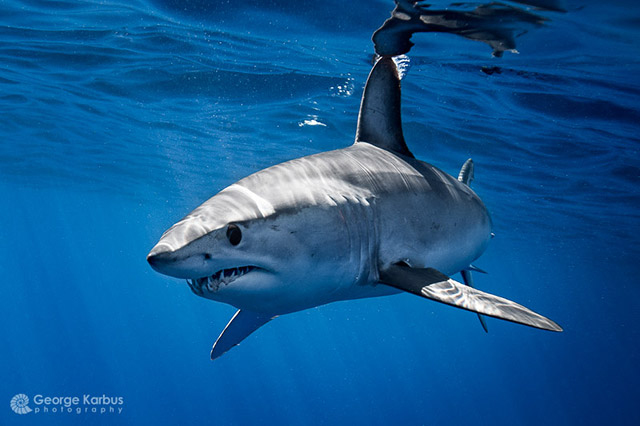THE MOST OUTRAGEOUS DISCOVERY OF THE DECADE
This unique and outstanding opportunity for divers arose from a successful project carried out in
collaboration with professional underwater photographer Jan Reyniers. Together we have been exploring these
waters for 2 years before we made the experience available to our divers.
UNPARALLED SUCCESS RATES
Between July and October the success of our Shark Expeditions is near 91%.
All our successful trips attracted Blue sharks, while Mako sighting always showed a huge variability between seasons,
from a maximum of 65% of the dives to a minimum of less than 10%.
UNPARALLED CONDITIONS FOR PHOTOGRAPHY
Between July and October the visibility ranges between 20 and 30 metres over the seamounts where we dive with
pelagic sharks.
On many occasions, though, visibility can be even better.
This factor, along with the excellent light, helps to create superb conditions
for outstanding photography and filmmaking.
TERMS & CONDITIONS
While success rates are very high for every activity included in the program and weather
is at its best between July and mid-October, you should be prepared to be flexible and let us organise
the activities according to our experience and, most importantly, safety requirements.
OTHER IMPORTANT INFORMATION
Every Shark Expedition is restricted to a maximum of 8 divers.
Plenty of time is allowed for each trip and no diver will be disappointed.
All participants should be at least 18 years old, certified to a minimum level equivalent to a PADI Advanced Open Water Diver
and have a minimum of 50 logged dives.
Animals and air permitting, divers will be able to spend up to 75 minutes in the water with the sharks.
Every diver is required to have valid Dive Insurance.
Please also consider insuring your diving and photographic gear as we are not liable to refund any damages.
Every diver is requested to wear full wetsuit and gloves.
We do provide thin neoprene gloves for free.
OUR GUARANTEES
Shark Diving
We guarantee that you will dive with sharks but we do not guarantee the success or viability of
every single trip.
Princess Alice seamount
We guarantee that you will see the huge, legendary Devil ray (Mobula tarapacana).
In case of adverse weather/sea conditions (remember that Princess is 45 nautical miles off Pico)
the activity could be cancelled and compensated with additional local dives.
Whale Watching & Dolphin snorkeling
We guarantee these activities and you will be entitled to 100% refund in case of adverse
weather/sea conditions or unsuccessful trips.
Coastal Diving
We guarantee the number of dives included in the program.
In case of adverse weather/sea conditions you will be entitled to 100% refund.
Activities skipped for personal reasons of the customer
No refund will be given. You may want your dive insurance to cover this.
Our pelagic sharks
Blue Shark
- Average length: 2.2 metres
- Maximum length: 4 metres
The Blue shark (Prionace glauca) belongs to the Carcharhinidae
family. Its slender body, sensitive snout and
long pectoral fins are
perfect adaptations for cruising the open ocean.
It inhabits deep pelagic waters and feeds mainly on cephalopods.
 Blue shark - Photo by Jan Reyniers
Blue shark - Photo by Jan Reyniers
The Blue Shark is highly threatened by long-line fishing, both as a target and as bycatch.
In the IUCN Red List (International Union for Conservation of Nature and Natural Resources)
is classified as Near Threatened.
Although widespread in all temperate and tropical oceans, few divers ever see them because of their preference for
offshore waters.
Hazard
Blue sharks are potentially dangerous but worldwide very few attacks have occurred and no fatalities.
During our encounters the sharks are very curious and approach closely, they do not act with aggression.
These are animals of the deep ocean and, for many shark aficionados, the most elusive and hard to see.
Shortfin Mako
- Average length: 3.2 metres
- Maximum length: 3.8 metres
Stocky and muscular, the Mako (Isurus oxyrinchus) belongs to
the Lamnidae family, which also includes the Great White Shark.
 Mako - Photo by George Karbus
Mako - Photo by George Karbus
The physiology of the Mako enables it to maintain a body temperature up to 8°C higher than the environmental temperature.
This allows it to be very fast and active, indeed the Mako is the fastest of all sharks.
It is mainly found in pelagic waters at depths from about 150 metres.
The Mako is a frequent target and bycatch of long-line fisheries and also a
target in big game fishing.
It is classified as Vulnerable in the IUCN Red List (International Union for Conservation of Nature and Natural
Resources).
Hazard
While aggressive behaviours have not been displayed during our encounters, the Mako is potentially very dangerous and diving in its presence requires extreme caution and heightened awareness.